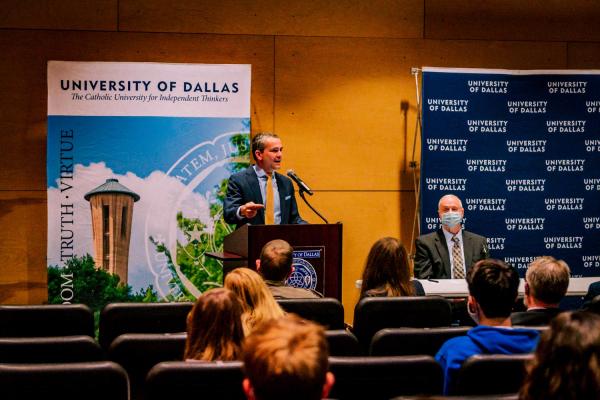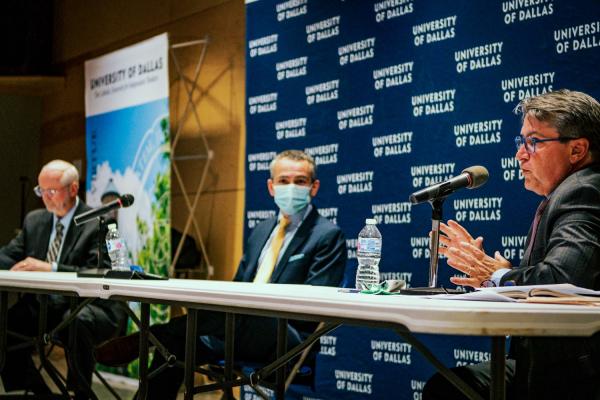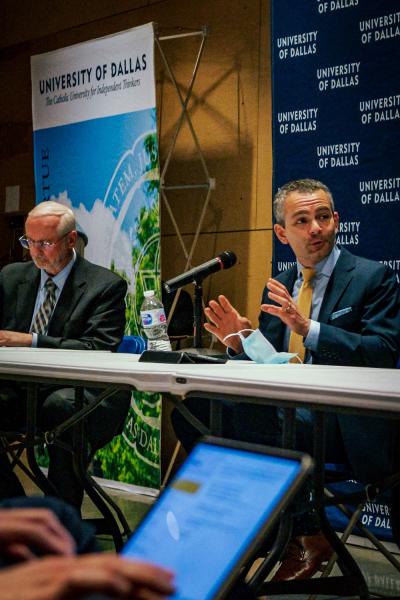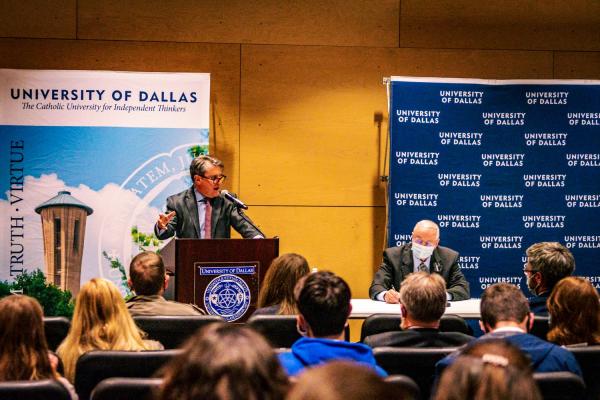 Menu
Menu




By Aaron Claycomb
Notable scholars and thought leaders from around the country gathered on the University of Dallas’ Irving campus to engage in lively dialogue on the merits of liberalism and Catholicism in America, during the university’s first-ever JPII Conference April 15–16.
Despite in-person capacity limitations the conference attracted more than 3,000 YouTube viewers. JPII Conference lectures will remain available via the University of Dallas YouTube.
The two-day engagement, organized by St. John Paull II Teaching Fellow Ryan T. Anderson, Ph.D., was hosted in collaboration with the American Public Philosophy Institute (APPI), and co-sponsored by Liberal Learning for Life, the university’s ongoing educational initiative.
"Since the beginning of our nation, Catholics have debated the structure of our government and the best ways to live as faithful citizens, both Catholic and American. The challenges confronting Catholics in America today renew these questions with particular urgency, and I'm grateful to the University of Dallas for its leadership in bringing together some of the brightest scholars addressing these issues today," said Ryan Anderson, conference moderator, who joined UD in 2019 with the formation of the St. John Paul II Teaching Fellowship in Social Thought.
The opening Galbraith Lecture, titled “Was American Liberalism Doomed to Fail?” on April 15, featured Patrick Deneen, professor of political science at the University of Notre Dame and frequent author of First Things, The American Conservative and The Chronicle of Higher Education, and UD’s Christopher Wolfe, Ph.D., distinguished affiliate professor and president of the APPI. That evening’s annual APPI Scherer Lecture, titled “Catholic Ideas Versus Catholic Realities?” featured Ross Douthat, New York Times op-ed columnist, conservative critic and former senior editor at The Atlantic.
Another series of panel lectures and concluding remarks continued on April 16. The first panel, titled “Does the Church (Still) Condemn Liberalism?” featured Joseph E. Capizzi, professor of moral theology and ethics and executive director of the Human Ecology Institute at The Catholic University of America, and Gladden Pappin, Ph.D., assistant professor of politics at UD and deputy editor of American Affairs. The final panel lecture, titled “Catholics and the Political Common Good Today,” featured Chad Pecknold, associate professor of theology at The Catholic University of America and frequent contributor to The Catholic Herald, First Things, The Wall Street Journal, the New York Post and National Review, and Daniel Burns, Ph.D., associate professor of politics, interim associate dean of the Constantin College of Liberal Arts and contributing editor at Public Discourse.
Robert Koons, professor of philosophy at the University of Texas at Austin, then offered closing reflections, answering various questions posed by panelists and attendees, including the definition of liberalism, the nature of the American regime, comments on culture versus politics, and the emerging universal theme of the philosopher Saint Augustine.
In an interview with The University News, UD’s student newspaper, Pappin explained, “As the liberal order grows fragile and sclerotic, more people are beginning to ask what comes next. Catholics have a strong role to play in that discussion with their robust tradition of the common good as well as of the Church itself.”
President and Provost Jonathan J. Sanford, Ph.D. said, "The University of Dallas, for many reasons — its rigorous liberal arts education, outstanding faculty, and commitment to service of Church and country — is uniquely suited to hosting an event that featured lively and serious reflections on Catholicism and the American political order. This conference provided our students and other participants an excellent opportunity to engage with and learn from leading scholars who are confronting questions regarding Catholicism and America from very different perspectives."